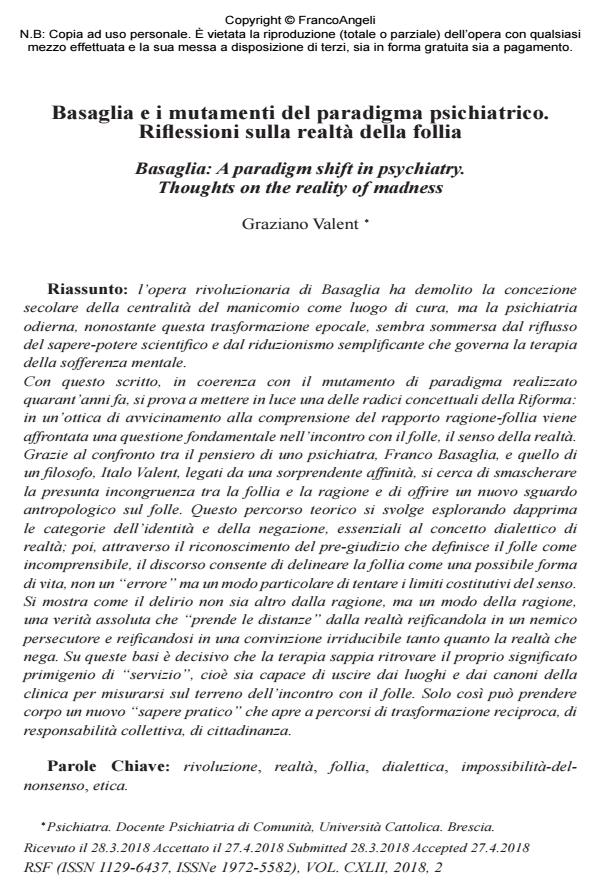Basaglia e i mutamenti del paradigma psichiatrico. Riflessioni sulla realtà della follia
Titolo Rivista RIVISTA SPERIMENTALE DI FRENIATRIA
Autori/Curatori Graziano Valent
Anno di pubblicazione 2018 Fascicolo 2018/2
Lingua Italiano Numero pagine 23 P. 27-49 Dimensione file 1856 KB
DOI 10.3280/RSF2018-002003
Il DOI è il codice a barre della proprietà intellettuale: per saperne di più
clicca qui
Qui sotto puoi vedere in anteprima la prima pagina di questo articolo.
Se questo articolo ti interessa, lo puoi acquistare (e scaricare in formato pdf) seguendo le facili indicazioni per acquistare il download credit. Acquista Download Credits per scaricare questo Articolo in formato PDF

FrancoAngeli è membro della Publishers International Linking Association, Inc (PILA), associazione indipendente e non profit per facilitare (attraverso i servizi tecnologici implementati da CrossRef.org) l’accesso degli studiosi ai contenuti digitali nelle pubblicazioni professionali e scientifiche.
L’opera rivoluzionaria di Basaglia ha demolito la concezione secolare della centralità del manicomio come luogo di cura, ma la psichiatria odierna, nonostante questa trasformazione epocale, sembra sommersa dal riflusso del sapere-potere scientifico e dal riduzionismo semplificante che governa la terapia della sofferenza mentale. Con questo scritto, in coerenza con il mutamento di paradigma realizzato quarant’anni fa, si prova a mettere in luce una delle radici concettuali della Riforma: in un’ottica di avvicinamento alla comprensione del rapporto ragione-follia viene affrontata una questione fondamentale nell’incontro con il folle, il senso della realtà. Grazie al confronto tra il pensiero di uno psichiatra, Franco Basaglia, e quello di un filosofo, Italo Valent, legati da una sorprendente affinità, si cerca di smascherare la presunta incongruenza tra la follia e la ragione e di offrire un nuovo sguardo antropologico sul folle. Questo percorso teorico si svolge esplorando dapprima le categorie dell’identità e della negazione, essenziali al concetto dialettico di realtà; poi, attraverso il riconoscimento del pre-giudizio che definisce il folle come incomprensibile, il discorso consente di delineare la follia come una possibile forma di vita, non un "errore" ma un modo particolare di tentare i limiti costitutivi del senso. Si mostra come il delirio non sia altro dalla ragione, ma un modo della ragione, una verità assoluta che "prende le distanze" dalla realtà reificandola in un nemico persecutore e reificandosi in una convinzione irriducibile tanto quanto la realtà che nega. Su queste basi è decisivo che la terapia sappia ritrovare il proprio significato primigenio di "servizio", cioè sia capace di uscire dai luoghi e dai canoni della clinica per misurarsi sul terreno dell’incontro con il folle. Solo così può prendere corpo un nuovo "sapere pratico" che apre a percorsi di trasformazione reciproca, di responsabilità collettiva, di cittadinanza.
Parole chiave:Rivoluzione, realtà, follia, dialettica, impossibilità-delnonsenso, etica.
- (RE)PENSANDO O CUIDADO NA FORMAÇÃO PROFISSIONAL EM SAÚDE: Relato de experiência Aline da Silva Melo, Ana Maria de Santana, in Psicologia e Saúde em Debate /2024 pp.12
DOI: 10.22289/2446-922X.V10N1A2
Graziano Valent, Basaglia e i mutamenti del paradigma psichiatrico. Riflessioni sulla realtà della follia in "RIVISTA SPERIMENTALE DI FRENIATRIA" 2/2018, pp 27-49, DOI: 10.3280/RSF2018-002003